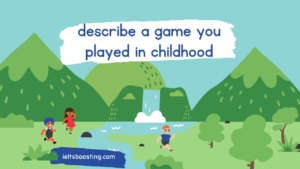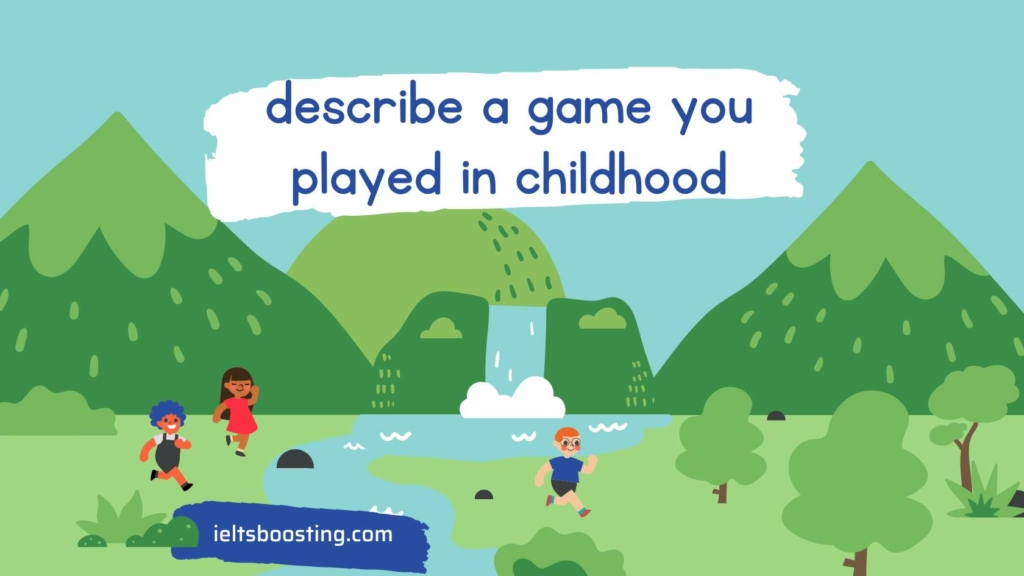Describe a game you played in childhood
You should say:
● What the game was
● Where you played it
● Who you played it with
● And explain why you enjoyed playing the game
Sample answer to describe a game you played in childhood
When I was younger, one of the games I thoroughly enjoyed playing was hide-and-seek, which was a classic childhood game that brought immense excitement and thrill. The game involved one person being the seeker, while the others hid. The game was played in various locations, including parks, neighborhood streets, and even inside our houses.
I usually played hide-and-seek with my neighborhood friends, who formed a close-knit group. We had spent countless hours running around, finding hiding spots, and trying not to get caught. The game fostered a sense of camaraderie and created lasting bonds among us.
There were several reasons why I found this game so enjoyable. Firstly, it provided a sense of adventure and mystery as we searched for the best hiding places. It also enhanced our problem-solving skills, as we could come up with creative strategies to avoid being found. Additionally, the exhilarating feeling of hiding and the anticipation of not getting caught made the game incredibly thrilling
Grammar points and vocabulary that can help students gain a higher score in IELTS Speaking Part 2
- Complex Sentences:
- Example: “When I was younger, one of the games I thoroughly enjoyed playing was hide-and-seek, which was a classic childhood game that brought immense excitement and thrill.”
- Relative Clauses:
- Example: “I usually played hide-and-seek with my neighborhood friends, who formed a close-knit group.”
- Conditionals:
- Example: “If we had not played hide-and-seek, we might not have formed such strong bonds.”
- Passive Voice:
- Example: “The game was played in various locations, including parks, neighborhood streets, and even inside our houses.”
- Perfect Tenses:
- Example: “We had spent countless hours running around, finding hiding spots, and trying not to get caught.”
- Modal Verbs:
- Example: “We could come up with creative strategies to avoid being found.”
- Descriptive Adjectives:
- Example: “It was a classic childhood game that brought immense excitement and thrill.”
- Idiomatic Expressions:
- Example: “The game fostered a sense of camaraderie and created lasting bonds among us.”
- Collocations:
- Example: “Formed a close-knit group,” “provided a sense of adventure,” “enhanced our problem-solving skills.”
- Linking Words and Phrases:
- Example: “Firstly, it provided a sense of adventure and mystery.”
- Synonyms and Paraphrasing:
- Example: “The adrenaline rush of hiding” could be paraphrased as “the exhilarating feeling of hiding.”
- Phrasal Verbs:
- Example: “Come up with creative strategies.”
Explore more: ielts speaking part 2

describe a game you played in childhood
Part 3 – describe a game when you were younger
What games do kids like to play now?
In Vietnam, children currently enjoy a diverse range of games, blending traditional activities with modern digital entertainment. They often engage in “exploring” outdoor games like hide-and-seek, reflecting their intrinsic curiosity and zest for adventure. Simultaneously, there’s a burgeoning interest in digital realms, with many gravitating towards interactive video games, which offer a virtual escapade from reality. This juxtaposition of the conventional and the contemporary encapsulates the evolving landscape of children’s play in Vietnam.
Advanced Vocabulary:
- Burgeoning: rapidly growing or expanding.
- Juxtaposition: the act of placing things side by side, especially for comparison or contrast.
Phrase Verb:
- Gravitating towards: to be attracted or drawn towards something.
Do boys and girls play different games?
Certainly, there is a noticeable dichotomy in the choice of games between boys and girls, influenced by cultural norms and individual preferences. Boys often lean towards more physically demanding and competitive games, such as soccer or video games that emphasize strategy and action. In contrast, girls may prefer games that foster social interaction and creativity, like playing with dolls or engaging in imaginative role-playing.
Advanced Vocabulary:
- Dichotomy: a division or contrast between two things that are represented as being entirely different.
- Spectrum: a wide range of different but related qualities or ideas.
Phrase Verb:
- Lean towards: to show a preference or inclination for something.
Are outdoor sports important for kids?
Outdoor sports are indeed crucial for children’s holistic development, offering a multitude of benefits. Engaging in outdoor activities aids in enhancing their physical well-being, contributing to better health and fitness. Furthermore, these sports often require teamwork and cooperation, instilling vital social and interpersonal skills. Children also learn to navigate challenges and develop resilience, a key attribute for personal growth.
Advanced Vocabulary:
- Holistic development: comprehensive growth encompassing various aspects of a person’s well-being.
- Resilience: the capacity to recover quickly from difficulties; toughness.
Phrase Verb:
- Aids in: helps in or contributes to.
Why do people play different games now than before?
The evolution in gaming preferences over time can be attributed to several factors. Technological advancements have revolutionized the gaming landscape, introducing an array of sophisticated digital games that were previously unimaginable. Societal changes, including shifts in lifestyle and leisure patterns, have also played a pivotal role in altering game choices. Additionally, the globalization of culture has broadened exposure to diverse games, leading to an amalgamation of traditional and modern gaming experiences.
Advanced Vocabulary:
- Technological advancements: Progress or development in technology.
- Globalization: The process by which businesses or other organizations develop international influence or start operating on an international scale.
Phrase Verb:
- Played a pivotal role in: To be central or crucial in bringing about a particular situation or outcome.
Is winning important in games?
While winning in games can be motivating, it’s not always the paramount goal; the intrinsic enjoyment and the development of skills often take precedence. Shifts in gaming preferences over time are largely due to technological innovations, which have expanded the realm of possible games, and cultural exchange, introducing new games globally. These factors have collectively reshaped the gaming landscape, moving beyond traditional boundaries.
Advanced Vocabulary:
- Paramount: Of utmost importance.
- Cultural exchange: The process of merging different cultures and their practices.
Phrase Verb:
- Take precedence: To be considered more important or prior in order or time.
Which is better, individual games or team-based games?
The preference between individual and team-based games varies according to personal inclinations and the skills one wishes to cultivate. Individual games often foster self-reliance and personal mastery, while team-based games enhance collaborative skills and social interaction. The evolution in gaming choices is largely attributed to technological proliferation, offering a wider array of digital options, and cultural diffusion, introducing diverse global games.
Advanced Vocabulary:
- Personal mastery: The process of continually improving and refining one’s skills and capabilities.
- Cultural diffusion: The spread of cultural beliefs and social activities from one group to another.
Phrase Verb:
- Foster self-reliance: To promote or encourage independence in oneself.


